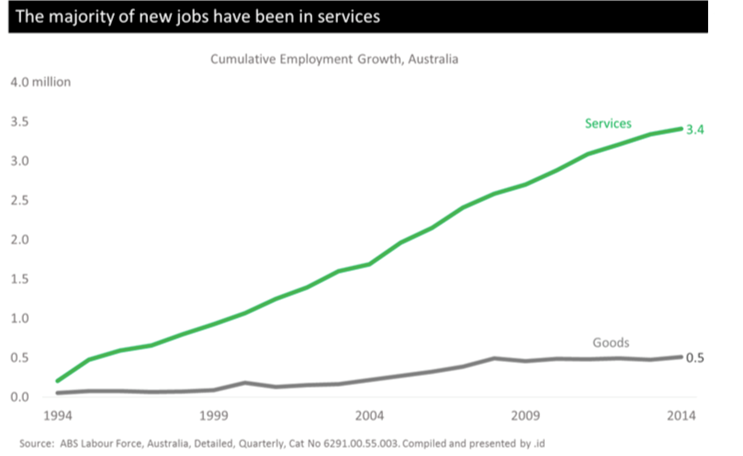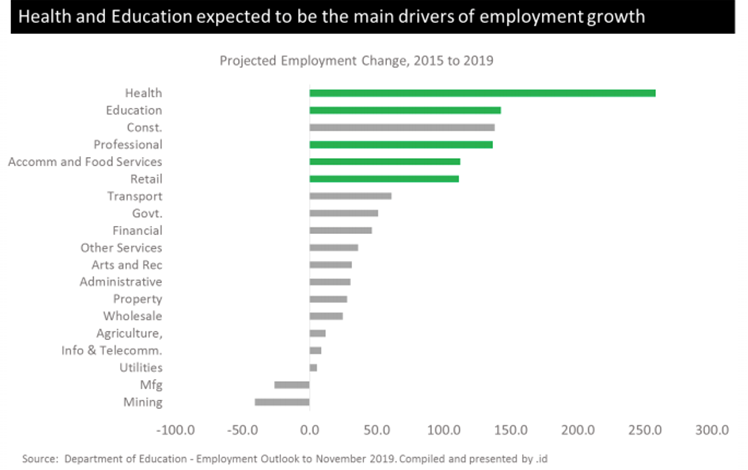“It would appear that a spot has at last been found upon the south coast of New Holland… All who have ever landed there agree to the richness of its soil and the abundance of its pastures.”
~~ Charles Sturt, 1833, surveying the future City of Adelaide.
Place matters.
The combination of economics and geography have always determined where our cities form and where they flourish. In agrarian societies, settlements were formed around farming land or trading routes. In the industrial age, cities started gathering around production centres. More recently, the Australian mining boom caused a surge in resource centre populations, though that tide has now turned.
One might expect that in the digital age, place no longer matters. People can do business from anywhere at anytime. Yet as Australia’s economy continues its transformation to services and knowledge intensive activities, we believe that place is becoming more important.
We identify a number of growth dividends associated with agglomeration and cluster-led development – by that we mean face-to-face, high-density business sectors, which promote a free-flow of ideas, skills and services.
Demand for businesses seeking to co-locate of cluster with other businesses has been largely driven by the importance of services and ideas. Businesses in clusters or precincts can benefit from access to larger pools of skilled labour, enjoy a wider range of services and amenities and share ideas. Silicon Valley is the obvious example. Our CBDs are another.
But our CBDs need help to relieve the pressure from congestion, tackle income inequality and maintain our living standards. Over focus on our CBDs can lead to diminishing marginal returns for agglomeration.
Can we identify the factors driving growth in our knowledge economies and create the right conditions to encourage growth and revitalise areas outside our CBDs – in our suburbs and regional cities?
These are the issues explored in a recent presentation I gave at the National Economic Development Australia conference “Local strategies to grow the suburban and regional service sector economy”. We explore several centres that have successfully positioned themselves as focal points of growth, and the strategies that worked well in their cases.
The structure of the Australian economy has changed substantially over the past 20 years. In line with the experience of all developed economies, there has been a shift away from manufacturing and towards services. According to the ABS, 3.4 million jobs have been created in the services sector since 1994, while just 0.5 million jobs were created in the goods sector.

This has coincided with an enduring shift towards a more educated workforce. Going forward, employment will remain concentrated in the high-skilled service sectors, with health and education particular stand-outs.
Notting Hill is a successful employment cluster in the middle-ring suburban City of Monash. As you would expect, having what we call ‘economic anchors’ – significant employers – in an area is a start. Importantly, shopping centres and retail are not the primary economic anchors they once were, allowing a greater role for health and education industries in recent times.
However, an economic anchor is only a start, and successful centres also focus on the needs of their residents, through transport and amenities, and on promoting the free-flow of ideas, through agglomerations of physically and economically interconnected businesses.
Seen through the prism of place, these are centres that create the ideal conditions for knowledge industries to thrive.
This is all part of .id’s ongoing agenda to research and understand the evolution of our cities and towns, and to provide strategic thinkers with the tools they need to shape and influence growth.
We welcome any thoughts or insights you can offer in the comments.











